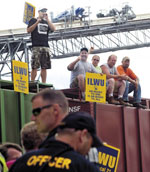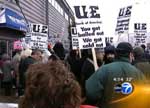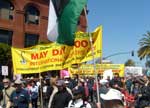
Showdown on West Coast Docks: The Battle of Longview
(November 2011).
click on photo for article

Chicago Plant Occupation Electrifies Labor
(December 2008).
click on photo for article

May Day Strike Against the War Shuts
Down
U.S. West Coast Ports
(May 2008)
click on photo for article
May 2013
Mobilize
Portland/Vancouver Labor –
Stop the Lockout, Scabs Out!

International Longshore and Warehouse Union Local 8 members in Portland, Oregon picket against
lockout by Columbia Grain, May 8. (Photo: Alex Milan Tracy / Demotix)
PORTLAND, Oregon – The international grain traders are on a union-busting tear. At the end of February, United Grain in Vancouver, Washington locked out Local 4 of the International Longshore and Warehouse Union (ILWU). The bosses are now operating the terminal with scab labor and armed guards supplied by J.R. Gettier Associates, a Delaware-based professional strikebreaking outfit. Then on May 4, Columbia Grain in Portland, Oregon locked out ILWU Local 8, using the same scab-herders. They must be stopped, and labor solidarity action is key.
This is make-or-break time for the West Coast longshore union. The grain monopolists want more than givebacks – they’re out for blood, and if they can, to destroy the ILWU. This is no time to “go it alone.” Patriotic appeals to support American bosses against “foreign” – and more specifically Japanese-owned – companies are poison. They are directly counterposed to what’s urgently needed: international labor action together with Japanese unions. It is necessary to mobilize labor’s power to defeat the profit-crazed grain monopoly.
The assault on the ILWU in the Pacific Northwest began with the construction of the Export Grain Terminal in Longview, Washington by industry giant Bunge together with Japanese and Korean shippers, which the consortium sought to staff with non-ILWU and non-union labor. There was a year of protests, including the “storming” of the EGT facility by hundreds of longshore workers and supporters. But in February 2012 union leaders signed a concessionary contract, with 12-hour days and a company hire list effectively bypassing the union hiring hall.
From the outset, we warned that the “significant concessions” by the union leadership “could set the stage for future battles as other shippers demand similar terms” (“Longview: EGT Union-Busting Beaten Back, At a Cost,” The Internationalist, February 2012). When the contract terms became known, ILWU militants called it “the worst concessionary contract ever” warning, “The effects … will be seen in the upcoming September Grainhandlers’ negotiations” (“Longview: Snatching Defeat from the Jaws of Victory,” Maritime Worker Monitor, 14 March 2012).
Although the union tops, reformist leftists and Occupy activists trumpeted the “victory” at Longview, the leadership never let the ILWU Local 21 membership in Longview vote on the contract. And sure enough, when Northwest Grain negotiations came up, the bosses demanded EGT-like concessions, in the name of “avoiding extreme competitive disparities among Northwest grain shippers” (The Oregonian, 10 September 2012). When the ILWU balked, the bosses imposed their terms. And at the least resistance, they locked the union workers out.
 Dock workers in Hong Kong, who
just had a bitter strike, show solidarity
with locked-out ILWU workers. (Photo: International Transport
Workers Federation)
Dock workers in Hong Kong, who
just had a bitter strike, show solidarity
with locked-out ILWU workers. (Photo: International Transport
Workers Federation)
In justifying the lockout, Columbia Grain accused the ILWU workers of “slowdowns, work-to-rule” and inspections of equipment that is supposed to be frequently checked to ensure worker safety. The Northwest Grainhandlers Association (NWGA) demanded “concessions to match employer-friendly working conditions at competing terminals in Longview and Kalama, Wash.,” and complained of “union perks” and “featherbedding” which were supposedly “threatening the survival of their terminals” in this “low-margin business” (The Oregonian, 5 May).
Naturally, the business press repeats these lies, railing against greedy, lazy, overpaid union workers endangering the “struggling” grain companies. Poor babies. In fact, the shippers are fabulously profitable international conglomerates which exert monopoly control to jack up grain prices globally. They have been repeatedly cited, fined and prosecuted for rampant safety violations, price-fixing and tax evasion. And this “corporate concentration” has been noted by Oxfam and other establishment famine relief groups as “a root cause of hunger and poverty.”
In the face of the concerted union-busting drive, dock unions should have undertaken strike action beginning last September, when the grain handlers presented their list of non-negotiable giveback demands. The ILWU on the West Coast could have hooked up with the International Longshoremen’s Association on the East and Gulf Coasts (whose contracts were also up for negotiation) to threaten, and if necessary carry out, a nationwide dock strike. But they sat on their hands, in part because they didn’t want to jeopardize the reelection of Democrat Obama.
 Above: Columbia Grain set up
separate access road at Portland's
Terminal 5 in anticipation of scabs.
Below: Professional strikebreakers of J.R.
Gettier advertise an army of black-shirted
scabs and thugs. (Photos: Pete Shaw; J.R. Gettier
website)
Above: Columbia Grain set up
separate access road at Portland's
Terminal 5 in anticipation of scabs.
Below: Professional strikebreakers of J.R.
Gettier advertise an army of black-shirted
scabs and thugs. (Photos: Pete Shaw; J.R. Gettier
website)
Then, when the NWGA imposed its terms in December (after their “offer” was voted down by 94 percent of ILWU members in the affected ports), pickets should have gone up all along the West Coast. With the ILA contract due on January 1, the pressure on the maritime employers and the bosses’ government would have been immense. But once again, the ILWU leadership did nothing, telling the ranks to take no action and work as ordered under the imposed terms, which included 12-hour days, the elimination of clerk jobs.
The policy of the ILWU leadership was to negotiate a contract with Temco (terminals in Tacoma, Washington and Portland) and then get the other companies in the NWGA to agree to it. But when the Temco agreement was unveiled in late February it was almost as bad as the imposed terms (and the EGT contract), giving up a host of union gains won through hard struggle in the past. While the leadership got the other locals to approve it, Local 8 in Portland, the largest grain port on the West Coast, voted “no.”
The day after the Temco agreement was ratified, United Grain in Vancouver locked out its ILWU workforce, with the transparent pretext of alleged “sabotage” by union officials that supposedly occurred two months earlier. The response of the union leadership boiled down to filing a raft of grievances with the National Labor Relations Board. It abided by a court injunction limiting the number of pickets, under heavy police presence, while rejecting offers by other ILWU locals to picket. And it unleashed a stream of Japan-bashing propaganda.
In response to the lockout, the Internationalist Group in Portland put out a leaflet saying:
“From the moment the union-busting contract was imposed, there should have been mass pickets shutting down all the terminals of the grain monopolies, with the threat to close every port on the West Coast – as well as East and Gulf Coast ports – if there was any attempt to operate with scabs. Now that this has happened, a call should go out from the union for dock workers everywhere to refuse to unload the scab cargo. All Mitsui cargo ships must be treated as strikebreakers and union-busters!”
–see The Internationalist No. 34, March-April 2013
We stressed that “flag-waving has no place in the workers movement, and will get the union nowhere.” But the response of the ILWU bureaucracy has been precisely to wrap itself in the Stars and Stripes and attack “Japanese corporations,” while hailing “Mitsui’s American competitor, TEMCO.” This was the theme of a March 8 ILWU rally in Vancouver, which instead of heading to the docks instead took a copy of the Temco contract to United Grain HQ.
A bulletin put out by the ILWU leadership following the United Grain/Mitsui lockout was headlined “Japanese Grain Lockouts Hurt NW Economy.” This has now been updated to include “Marubeni, owner of Columbia Grain in Portland.” The flyer complained that “Mitsui and Marubeni demanded hundreds of changes” in the contract in force since 1934, and accused them of “aggressive attempt to undermine American jobs.” It concluded by praising the “win-win agreement” and “safe and fair contract” with “American-based TEMCO.”
This outrageous support for “American” bosses goes against decades of ILWU support for international labor solidarity. It is also self-defeating for a union engaged almost exclusively in international trade. How would the ILWU tops like it if Korean and Japanese unions attacked “American beef” (as some misguidedly have) which is loaded by ILWU longshore workers? Locked-out workers at United Grain and Columbia Grain need support action by Japanese unions and waterfront/maritime unions everywhere.
 And, in fact, on March 15,
Tokyo-area rail workers of the Doro-Chiba union
demonstrated in solidarity with the ILWU outside
the Mitsui headquarters. They held a banner
declaring, “Mitsui, United Grain: Stop
Union-Busting! Stop TPP!” (the Trans-Pacific
Partnership to create a giant imperialist
“free-trade” area). Doro-Chiba has previously
shown internationalist solidarity, supporting
the ILWU’s May Day 2008 strike against the Iraq
and Afghanistan wars and inviting Local 21
president Dan Coffman to speak at a November
2011 Tokyo rally during the EGT fight.
And, in fact, on March 15,
Tokyo-area rail workers of the Doro-Chiba union
demonstrated in solidarity with the ILWU outside
the Mitsui headquarters. They held a banner
declaring, “Mitsui, United Grain: Stop
Union-Busting! Stop TPP!” (the Trans-Pacific
Partnership to create a giant imperialist
“free-trade” area). Doro-Chiba has previously
shown internationalist solidarity, supporting
the ILWU’s May Day 2008 strike against the Iraq
and Afghanistan wars and inviting Local 21
president Dan Coffman to speak at a November
2011 Tokyo rally during the EGT fight.
The longshore workers of Local 4 (Vancouver) and Local 8 (Portland) have their backs to the wall. They want to fight against the union-busting. They’re out there picketing, managers and scabs drive right into the picket line, and the cops arrest the picketers! What’s needed is to build picket lines so big and militant that no one dares cross. What’s needed is to hit the shipping bosses up and down the coast. What’s needed is for Japanese and American workers to join in struggle against their bosses. The Japan-bashing promoted by the leadership hurts that fight.
Not only does the ILWU leaders’ nationalist appeal undercut international labor solidarity, its praise for American capitalists is 100% wrong. In the first place, the Temco contract is hardly “win-win,” it is a win for the bosses and a huge loss for the workers, ripping up decades of union gains. Secondly, it wasn’t just Mitsui and Marubeni that demanded hundreds of givebacks, it was the entire Northwest Grainhandlers Association. And third, the main owner of Temco, Cargill, is one of the worst U.S. corporations for safety and labor relations.
Back in 1972 Cargill tried to get out of hiring ILWU ship clerks in the ports of San Francisco and Sacramento. ILWU Local 34, representing clerks in the S.F. Bay Area, set up a picket line which other ILWUers refused to cross, and forced Cargill to respect its contractual obligation. Now, the current ILWU leadership is giving Cargill/Temco everything they wanted in ’72, and a whole lot more. Cargill is also notorious for dangerous working conditions. Some recent cases:
- In November 2012, OSHA (the Occupational Safety and Health Administration) slapped a fine on Cargill for repeated safety violations at a Beardstown, Illinois pork processing plant.
- In August 2012, a worker was killed in a fall at a Cargill soybean processing plant in Bloomington, Illinois.
This is the company that is being held up as the example of “good” bosses. No way.
 Heavy police presence at picket
lines of ILWU Local 4 in Vancouver,
Washington. (Photo:
Troy Wayrynen/The Columbian)
Heavy police presence at picket
lines of ILWU Local 4 in Vancouver,
Washington. (Photo:
Troy Wayrynen/The Columbian)
Port workers in Portland, Vancouver and throughout the Pacific Northwest are facing a powerful and ruthless enemy in the international grain trade cartel. The so-called “ABCD” companies (Archer Daniels Midland, Bunge, Cargill and Dreyfus) control “between 75% and 90% of the global grain trade” (London Guardian, 2 June 2011). They have deep pockets (ADM revenues, $89 billion in 2012; Bunge, $58 billion in 2011; Cargill, $134 billion in 2012; Dreyfus, $46 billion in 2010). Cargill is the largest privately held company in the U.S.
The Japanese conglomerates Mitsui (United Grain), Marubeni (Columbia Grain) and Itochu (part of the EGT consortium) are latecomers to the grain cartel. They are no doubt seeking competitive advantage by lowering labor costs and busting unions, as well as increasing productivity with more modern facilities at EGT. But they are backed to the hilt by U.S.-owned Cargill, which in 2011 loaded grain that would have gone to the scab EGT facility. The Temco “deal” is only an interim contract, to be replaced by whatever the other shippers agree to.
And, of course, the armed and dangerous scabherders of J.R. Gettier – modern-day Pinkertons – are very American-owned.
Judging by its statements, the ILWU bureaucracy had a plan of sorts, but one doomed to fail. The idea was to give the grain shippers most of what they wanted in terms of givebacks, in return for ILWU jurisdiction. When the concessionary EGT contract was announced, Coast Committeeman Leal Sundet was quoted in the ILWU Dispatcher (January 2012) saying:
“The ILWU contract with EGT is key to standardization of the grain export industry on the West Coast, particularly with respect to labor costs. This standardization brings stability for everyone from the farmer to the overseas importer, and it guarantees profit throughout the market chain.”
Profit for the bosses, for sure. Because what Sundet was advocating is giving up hard-won gains in the Northwest grain contract in the name of “standardization of labor costs.” Meaning what?
Let’s see: the EGT contract includes 12-hour and even 13-hour shifts; exempts EGT from the port requirement to hire from the ILWU; gives up ILWU presence in the control room; gives up ship clerks’ jobs; permits managers, subcontractors or any kind of scabs to replace ILWU workers during any work stoppage, authorized or not; lets EGT establish its own list of “pre-approved employees” who can be removed at any time, at its “sole discretion,” by-passing the hiring hall; and promises to rewrite any clause to conform to the anti-labor Taft-Hartley Law.
The supposedly “win-win” Temco “interim agreement” permits 12-hour shifts; lets the company select all steady employees and temporary replacements except utility men; and sacrifices ship clerks’ jobs. Workers at the Kalama Temco facility would now be included in the contract, but at the cost of making these huge concessions on fundamental union gains. We noted before that ILWU leaders like Sundet (who used to work for the shipping bosses’ Pacific Maritime Association) “think like labor contractors rather than union defenders.”
But it turns out the grain bosses aren’t so hot on having the ILWU act as a labor contractor. With continuing mass unemployment, they figure they can hire “replacement workers” who are desperate for a job much cheaper on the Internet (they already have ads on Craig’s List). Gun thugs from Gettier Associates can keep the workers in line and the union at bay. The NGWA isn’t aiming for a concessionary contract but no contract at all. And if they get away with it in Northwest grain, you can bet your bottom dollar that the PMA will be going for that in 2014.
 PMA president James McKenna
(left) and ILWU president Bob McEllrath
receive joint award from containerization
group for negotiating contract giving
green light to robotics. (Photo: Containerization and
Intermodal Institute)
PMA president James McKenna
(left) and ILWU president Bob McEllrath
receive joint award from containerization
group for negotiating contract giving
green light to robotics. (Photo: Containerization and
Intermodal Institute)
The name of the game for the present ILWU leadership is class collaboration. Sundet is the very embodiment of the modern class collaborator: even though he’s now on the union side of the table, he’s still looking out for the companies’ interests, touting profitability and keeping down labor costs. And International president Bob McEllrath in 2009 received an award from the Containerization and Intermodal Institute along with the president of the PMA, James McKenna, for negotiating a six-year labor pact without a strike (Journal of Commerce, 9 October 2009).
Far from being “win-win,” class collaboration is a losing proposition for workers. The 2008 Pacific Coast Longshore Contract Document gave a green light to the massive introduction of robotics, without a bit of compensation. The PCLCD, “recognized that the introduction of new technologies, including fully mechanized and robotic-operated marine terminals, necessarily displaces traditional longshore work and workers,” only stipulating that mechanics would remain ILWU. But already ILWUers are being displaced on these jobs in Los Angeles-Long Beach.
Another example: last year a dispute erupted at the port of Portland when the ILWU went after a handful of jobs involving connecting and disconnecting reefers, work that for years had been performed by IBEW electricians. There were various ways this could have been worked out amicably by the unions, including by setting up a port workers council including all the unions (and the terribly exploited, non-unionized and largely immigrant port truckers). But instead, the ILWU tops along with the PMA filed suit in the bosses’ courts to take the jobs from the IBEW.
Behind the present showdown over Northwest grain shipping is the fact that, as a report by Oxfam, the liberal famine relief organization, Cereal Secrets: The world’s largest grain traders and global agriculture (August 2012) noted, “a number of the established Japanese trading companies – the sogo shosha such as Mitsui and Marubeni – are proposing to expand their grain trading and production operations, and … the ABCDs may well find their dominant position being eroded.”
 What
it will take: ILWU longshore workers face
off against police and sheriff's deputies in
Longview, Washington, 7 September 2011. The
next day hundreds of union supporters
occupied the scab facility to protest
arrests.
What
it will take: ILWU longshore workers face
off against police and sheriff's deputies in
Longview, Washington, 7 September 2011. The
next day hundreds of union supporters
occupied the scab facility to protest
arrests.
So the union tops are targeting Japanese companies while bidding for support from its “American competitors,” in defense of “America’s tax dollars” and “American jobs.” Rather than fighting to defend and extend existing union gains to the whole of the grain shipping industry, they are supporting the established cartel against the newbies. But the star-spangled labor bureaucracy will discover soon enough that any residual toleration by the ABCDs will quickly evaporate if the lockouts are successful. Capitalist competition will require it.
The Internationalist stands for the opposite, for sharp class struggle against the capitalists and their state, which has hamstrung the unions with a web of anti-labor laws. As we have said: Playing by the bosses rules is a losing game – labor’s gotta play hardball to win! The misleaders of labor often try to scare the union ranks by claiming that any protest would violate the Taft-Hartley Act, a/k/a the “slave labor law.” For years, the ILWU defied the anti-communist law that tried to ban the union hiring hall. But now the union tops hide behind it as an excuse for inaction.
Another argument that’s raised against protesting the lockout is “now is not the time.” But even if the showdown comes next fall, as the harvest comes in, it must be prepared by a show of force and concerted action now, to make clear the to grain monopolists that the union means business and it will fight. Longshore workers cannot take a lockout lying down: look at the fate of Liverpool dockers in England, where the union was destroyed. Backed by waterfront and maritime unions worldwide, the ILWU and all labor and supporters of workers’ rights in the Lower Columbia River area should make crystal clear: Portland is a union town, scabs must go!
The idea of supporting “good” American bosses against “bad” Japanese bosses is nationalist garbage, and it won’t work. All the members of the grain shippers monopoly are price gougers, famine-mongers and union-busters. Anyone who tells you different is lying. The only way they can be stopped is by bringing out the concerted power of the labor movement – locally, in the Pacific Northwest, up and down the coast, nationally and internationally. Labor solidarity action with broad support from working people can defeat the capitalist war on workers.
It comes down to a question of leadership. To wage this war successfully it is necessary, throughout the labor movement, to oust the pro-capitalist bureaucracy, break with the Democrats and build a class-struggle workers party.
It can start in Portland. We can start it.
An injury
to one is an injury to all!
Already, seven union locals in the Portland/Vancouver area have passed resolutions pledging to “aid our sisters and brothers of ILWU Local 8 in building mass pickets at Columbia Grain at the Port of Portland, as well as rallies and other solidarity actions.” This includes: ILWU Local 5; Laborers International Union Local 43; IUPAT (Painters) Local 10; UBC (Carpenters) Local 156; IATSE Local 28; SEIU Local 503 stewards council; Pipefitters Local 290. To realize this potential solidarity, the ILWU or sections of it must take the lead.
To contact the League for the Fourth International or its sections, send an e-mail to: internationalistgroup@msn.com